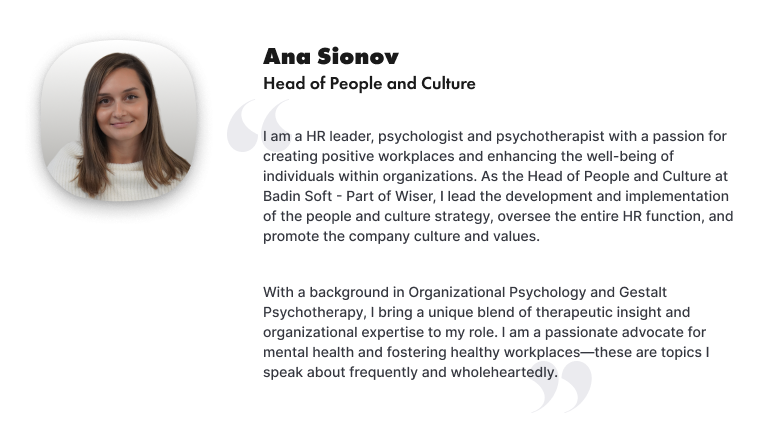
When caring about people is what motivates and drives your business, it is organized in a way to support that idea every step of the way. Given that this is something that always drives our company forward, regardless of the situation, we made sure that the organization revolves around people. One of the concepts that makes this possible and brings great value to the company is people management.
What is People Management?
As the name states, people management is the process of managing people, it involves overseeing and guiding individuals within an organization to foster their growth and achieve both personal and organizational goals. It emphasizes leadership, motivation, development, and collaboration to align with the company’s mission and vision. This process also requires understanding employees’ needs and expectations while cultivating a supportive culture that encourages improvement and engagement. Effective people management is essential for a thriving organization, as it directly impacts employee satisfaction, overall engagement, and productivity among employees.
Key areas of people management include a range of responsibilities involving team members, from participating in the recruitment process and onboarding new team members to overseeing career development, managing performance, enhancing employee engagement, and handling change management. While these are structured processes, at our company, people management goes beyond formalities.
Basically, it refers to caring about the well-being of the people we work with, with a focus on empathy and support.
Why is People Management Important?
Each person is assigned a dedicated People Manager based on either team structure or specific technology focus. Effective people management plays a key role in the health of the organization, influencing team performance, engagement, and employee satisfaction. Skilled People Managers inspire motivation, promote open communication and collaboration, and help team members understand the broader organizational goals.
When done the right way, the role of a People Manager has a positive impact on:
- Retaining talent
- Boosting productivity and engagement
- Fostering a positive and inspiring work environment
- Supporting career development and performance growth
- Facilitating smooth collaboration
- Building trust
- Sustaining a healthy team dynamic
- Motivating team and organization members
Shaping this culture isn’t solely the responsibility of the People and Culture team; it requires collaboration between the top management and People Managers to create a healthy work environment. A positive culture boosts employee morale, attracts top talent, and enhances the organization’s reputation—both internally and externally.
Research shows that teams led by skilled People Managers achieve better results across diverse regions and industries, including higher productivity, increased sales, growth, and improved employee retention.
What Makes a Good People Manager?
To become exceptional leaders, People Managers need not only strong soft skills, social awareness, and emotional intelligence, but also a solid understanding of business operations. This requires close collaboration with company leadership. Additionally, they should possess relevant hard skills and an understanding of the challenges their team members face, even if they are not proficient in the same technologies. With this, People Managers can effectively align company objectives with the team and individual goals.
Key people management skills include:
- Performance Management: Prioritizing results and delivering value.
- Promoting Team Growth: Encouraging continuous skill development to keep pace with rapidly evolving technologies.
- Problem Solving and Conflict Resolution
- Clear and Open Communication: Practicing transparent communication and providing constructive feedback.
- Mentorship: Guiding team members in professional development across technical, business, and interpersonal areas, such as client relations, leadership, and business-minded software development.
- Agility and Adaptability: Navigating and managing organizational changes effectively, helping the team adapt to evolving demands and challenges.
- Alignment with Business Goals: Connecting people management efforts to organizational objectives and understanding its role in supporting business strategy.
- Commitment to Learning: Continuously embracing new technologies, industry trends, and methodologies.
- Responsibility and Integrity: Leading with accountability and upholding high ethical standards.
People Managers are typically the first point of contact for their team members when addressing concerns, and they are expected to approach these situations with empathy and integrity.
Finally…
Proper people management is the foundation of a thriving and successful organization. Fostering a positive work environment, encouraging open communication, and setting strong examples among employees are essential for unlocking the organization’s full potential.
Whether seen as art or science, people management is for those who take pride in, and celebrate the achievements of others. The right person for this role is someone who shifts from “I” to “We.”
The author of the blog is Ana Sionov, Head of People and Culture at Badin Soft – Part of Wiser.

You may also like

How People Management Contributes to a Healthy Organizational Culture
November 14, 2024

Learning by Doing: The Growth Story of our Frontend Juniors
September 3, 2024

The Art of Perfect Placement (3R): Right Talents, Right Projects, Right Timing
August 20, 2024

Streamline your Workflow with Spreadsheet
July 19, 2024

Mastering Business Development in the IT industry: Essential Tips and Tricks
April 10, 2024

From the Code to the Conference
March 7, 2024

My First Salary as the First Step Towards a Career in IT: Testimonials & Advice
December 4, 2023

Nurturing Growth Through Mentorship: Three Teams, One Name
October 9, 2023

Mirror Neurons: Do They Help Us be Better Leaders?
April 3, 2023

Saveti naših koleginica – Šta biste rekle mlađoj verziji sebe?
March 8, 2023




